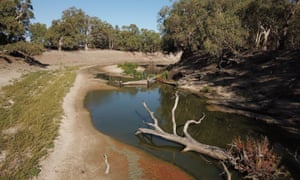
 The controversy over CSIRO’s engagement in Murray-Darling policy boiled over in the Senate recently with a series of tense exchanges between senior politicians and members of the Executive Team.
The controversy over CSIRO’s engagement in Murray-Darling policy boiled over in the Senate recently with a series of tense exchanges between senior politicians and members of the Executive Team.
Water management of the Murray-Darling river system – and the underlying research – has been the subject of intense debate throughout the summer following the mass death of many thousands of freshwater fish near the Menindee Lakes.
While the fish kill events led to two separate scientific studies to explain the catastrophe; the findings of the South Australian Murray-Darling basin Royal Commission criticised both the federal statutory authority charged with management of the rivers and the quality of CSIRO’s participation in the inquiry process.
CSIRO Executive no show
In his final report, Bret Walker SC said that “notwithstanding its status as Australia’s leading, independent, scientific research body, the CSIRO declined to attend and participate in debate and discussion concerning matters of scientific controversy with national significance. The Commissioner regards the lack of responsiveness, apparent lack of interest and presumptuous tardiness of the CSIRO in this regard as reflecting no credit on a once well-regarded institution.”
In testimony before the Senate’s Economics Legislation Committee, CSIRO Executive Director Peter Mayfield admitted that CSIRO declined to appear before the Royal Commission – despite a formal request to attend – relying instead on a voluntary, written submission.
“You made a voluntary submission in writing, but did you also make a decision not to appear before the commissioner?” asked Shadow Science Minister Senator Kim Carr.
“Yes, that’s correct,” Dr Mayfield said.
Senate stoush
“We felt that the submission was the best pathway to take. We would be able to state our position. The (royal commission inquiry) process was running to its conclusion at that stage… We felt the written submission, which stated our facts, was the appropriate way.”
Chief Executive Larry Marshall pushed back at perceptions that CSIRO had something to hide.
“Let’s be clear, CSIRO has never operated under any sort of veil of secrecy. We publish more than 3,000 articles as year… we are as trusted as the Red Cross—right now, today.”
When pressed on why CSIRO’s “strong track record” in Murray-Darling science prevented the organisation from attending the royal commission, Dr Marshall said the research stood for itself.
“I’m not trying to make an excuse for not turning up… our science is published. It is clear. It stands on its own merits.”
Grim picture
A panel of scientists – convened by the Australian Academy of Science at the request of Opposition Leader Bill Shorten – laid the blame for the fish deaths at authorities charged with managing the river system.
“The conditions leading to this event are an interaction between a severe (but not unprecedented) drought and, more significantly, excess upstream diversion of water for irrigation… prior releases of water from Menindee Lakes contributed to lack of local reserves.”
Meanwhile a separate, Government-commissioned report – chaired by Professor Rob Vertessy – found that “the fish death events in the lower Darling were preceded and affected by exceptional climatic conditions, unparalleled in the observed climate record.”
“The recent extreme weather events in the northern Basin have been amplified by climate change. Future changes in the global climate system are likely to have a profound impact on the hydrology and ecology of the Murray–Darling Basin and exacerbate the risk of fish deaths,” the report concluded.
Call for collaboration
The Murray-Darling Basin Authority – subject of intense criticism by the Royal Commission and public outcry following the fish kills – has appealed to the scientific community for assistance.
“We need input from the scientific community and other stakeholders to make sure our climate change work program is fit for purpose and will meet the future needs of the Basin’s environment, communities and industries,” authority chief Philip Glyde said.
“We take our responsibility to lead improvements in science and knowledge very seriously so we can put forward solid, evidence based policy.
“We’ll be working closely with scientists in a wide range of fields, including experts at the CSIRO, the Bureau of Meteorology, different research bodies across Australia as well as with our own scientific advisory body,” Mr Glyde said.
Related content